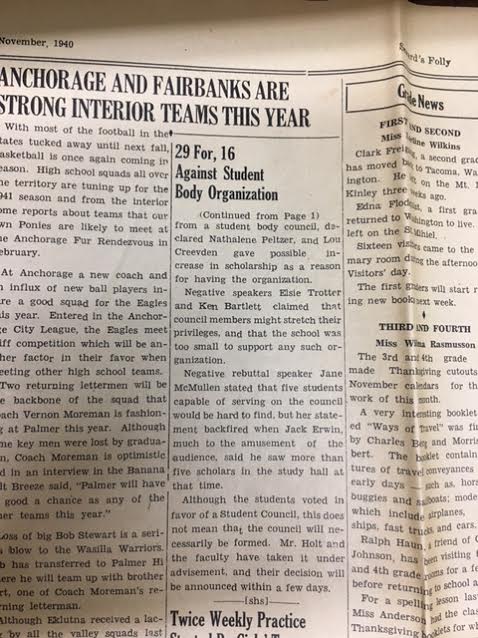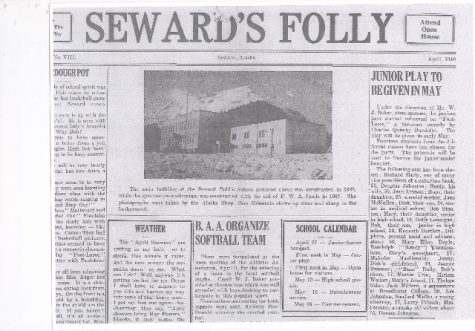SHS Student Council: A Blast From the Past
May 9, 2017
Student council, the voice of Seward High, plays an important factor in the everyday lives of students. Pep rallies, spirit weeks, and the last day barbeque are all results of the hard work and countless hours put in by the current recent representatives of the student body. In its early years of inception, it was quite different from its present standing.
The November 1940 issue of the Seward’s Folly recalls the school wide debate between elected class representatives on the topic of whether or not Seward High should have a student body council. The affirmative was taken by Elsie Trotter, Ken Barlette, and Jane McMullen, while Lou Creevden, Jack Erwin, and Nathalene Peltzer upheld the negative. In the end, the affirmative pulled through with the popular vote of 29-16 students.
At first glance, it seems as if this was a just decision; however, upon further investigation, the negative team’s claims prove their roots in competence. The affirmative discussed the benefits of student council such as increased student involvement and the teaching of leadership skills. The negative, on the other hand, provided a counterargument: the dangers of taking power from the faculty and granting it to the student body. After a long, tiresome debate, the speakers boiled their cases down to the strengthened faculty/student relationships for the betterment of the school versus an uneven distribution of power within the student body. In the end, a democracy within the student body was seen as valuable and the probability of a totalitarian student-led organization, unlikely. Even as the debate came to an end, student council’s fate was in question.
Decades later, the Seward High student council has certainly changed. Co-sponsor, Chad Hinders, has led the council since the beginning of his teaching career in Seward in 2008. Before his arrival, the program was in the process of evolution for years according to Mr. Hinders. Prior to 2008, Stephanie Cronin and Jennifer McDonald kept the organization active, processing new electives each year, sporting new school events, and running many fundraisers. Meeting on their spare time and participating on free will, those students who are eager to participate have and continue to gain invaluable experience. However, as the 1940 debate discussed, should student council be in existence today?
Many say student council is a valuable and necessary experience. The organization increases student involvement and teaches leadership skills. Although, could it be overshadowing the opinions of the majority? Does the council decrease the desire for students to interact in school events due to its totalitarian nature? Over seventy years ago, the council was in question for its function. Now, in 2017, the program has six participants and struggled to meet its representative quota after elections. Students are no longer battling for their voice to be heard; they are not sharing their opinions at all. Whether it be the exclusive nature of the organization, perpetuated through elections, or an increase of student activities taking away from student involvement, there are no longer bolstering participation rates among students in the council. It is time to encourage those who want to make a change to step forward and join the program.









